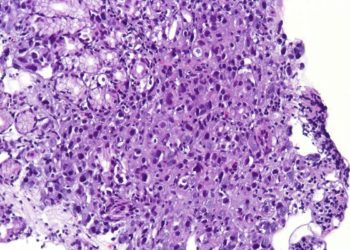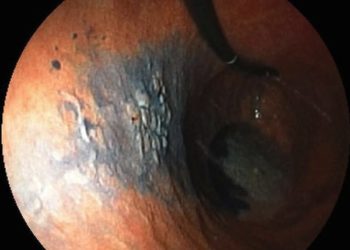Equivalent efficacy of Paclitaxel or Irinotecan for advanced gastric cancer
Image: PD
1. There is no significant difference in treating advanced gastric cancer refractory to chemotherapy with Paclitaxel or Irinotecan.
Evidence rating level: 1 (Excellent)
Study Rundown: Gastric cancer, though uncommon in the United States, is among the most common cancers diagnosed worldwide. Though the development of chemotherapy with fluoropyrimidine plus platinum has improved the prognosis of this disease, options for disease refractory to treatment are minimal. Many phase II trials evaluating the toxicities of paclitaxel or irinotecan have been completed, and currently taxanes and irinotecan are the two main options for second line chemotherapy. The purpose of this study is to directly compare these therapies in order to guide the management of these patients.
At the conclusion of the study, the authors found that there was no statistically significant difference between paclitaxel and irinotecan as second-line chemotherapy for advanced, refractory gastric cancer in overall survival, progression-free survival or in response rate. The activity, feasibility and tolerability of these treatments were also comparable. On the basis of these results, the study authors concluded that both drugs are reasonable second line therapies. Their findings will also serve as a basis for future trials evaluating additional second line therapies for advanced gastric cancer. These results are strengthened by the design of this trial, which involved randomizing patients from 37 centers in Japan under controlled conditions.
However, it should be noted that this was an open-label trial, thus introducing possible researcher biases or patient behavior changes that could have influenced the outcome of this study. Furthermore, though it was a multi-center trial, all patients were Japanese, and their primary chemotherapy with S-1 and cisplatin may not reflect current practices in other countries. The results of this trial are also not applicable to patients with severe peritoneal metastases.
Click to read the article in JCO
In-Depth [Randomized, open-label trial]: In this phase III trial, the study authors randomly assigned a total of 223 patients to receive either Paclitaxel (80mg/m2 on days 1, 8 and 15, every 4 weeks) or Irinotecan (150mg/m2 on days 1 and 15, every 4 weeks). Patients with severe peritoneal metastasis were excluded. The primary outcome and end point was overall survival (OS), and secondary end points progression-free survival (PFS), response rate, adverse events, and the proportion of patients who received third-line chemotherapy. Median follow-up was 17.6 months.
Median OS was 9.5 months and 8.4 months in the paclitaxel and irinotecan groups, respectively (P = 0.38). Median PFS was 3.6 months and 2.3 months (P = 0.33). Treatment response rate was 20.9% and 13.6% (P = 0.24). Third-line chemotherapy was given to 89.8% of paclitaxel patients and 72.1% of irinotecan patients (P = 0.001). Overall, the two treatment arms differed only in terms of third-line chemotherapy, with no significance differences found in OS or PFS.
By Monica Parks and Andrew Bishara
More from this author: Rituximab linked with reduced chronic immune disease following stem cell transplantation, High-dose prophylaxis for hemophilia increases costs with minimal benefit, Ambrisentan found ineffective against idiopathic pulmonary fibrosis
© 2013 2minutemedicine.com. All rights reserved. No works may be reproduced without expressed written consent from 2minutemedicine.com. Disclaimer: We present factual information directly from peer reviewed medical journals. No post should be construed as medical advice and is not intended as such by the authors, editors, staff or by 2minutemedicine.com. PLEASE SEE A HEALTHCARE PROVIDER IN YOUR AREA IF YOU SEEK MEDICAL ADVICE OF ANY SORT.






